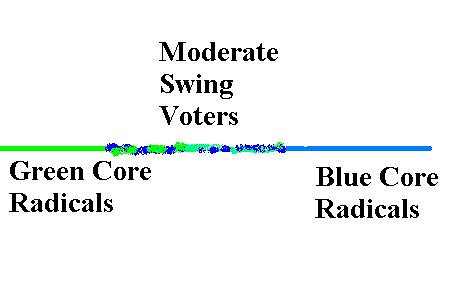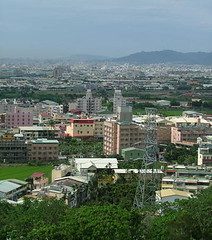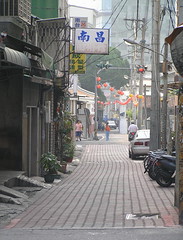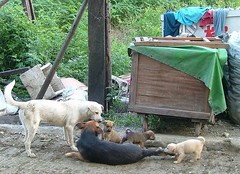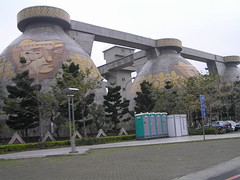
The past few days the Taipei Times has been running articles on the changes at one of the most important of the nation's rural institutions, the farmer's associations. According to
this 2005 paper, Taiwan has 281 local farmers' associations, 21 city and county farmers' associations and one provincial farmers' association. "These local farmers' associations are the most important social and economic cooperative organizations in local areas of Taiwan." They are critical for understanding how Taiwan's politics function.
The farmers' associations were established in 1900 by local farmers during the Japanese colonial period. The colonial government took them over and operated them as an administrative arm of the government. They formed the core of the colonial government's agricultural extension program, which was involved in standardizing seed varieties, introducing new farming methods, and other developmentalist activities. Membership was required of all rural households. By the 1920s these were major institutions with 40,000 employees.
In 1949, when the KMT fled to Taiwan the existing agricultural cooperatives and farmers associations were merged. In 1950 the US AID team came in, and the associations were reorganized based on the recommendations of the Joint Commission for Rural Reconstruction (JCRR). Again developmentalist in orientation, the purpose of the associations shifted to providing better credit facilities for finance of new technology. During the Japanese period rural credit had been a major agricultural issue, and high interest rates were the norm.
The associations are organized in a hierarchy with the provincial farmers' association as the main management unit. Membership of the 300 such organizations includes anyone and everyone doing farm business in Taiwan, including owner-cultivators, tenants, hired hands, agricultural extension works, and employees of state-run firms. By the 1980s total membership consisted of over 85% of households, or 1.3 million people. Both full and associate memberships are available. Because these organizations are important sources of rural credit, small businessmen are often members, especially in urban and suburban areas. Another driver of membership in urban areas was land sales -- until the late 1990s, to buy and sell agricultural land, you had to be registered as a farmer. Many a white collar worker in a Taipei office was listed as a farmer somewhere so that he could engage in lucrative agricultural land deals on the city outskirts.
Under the system, the general managers of these cooperatives are not elected, and never have been. Instead, the farmers elect representatives who elect a board of directors who in turn select the general managers of the cooperatives. The candidates are then officially appointed by the Department of Agriculture and Forestry. As Hung Mao-tien noted in his excellent work on the transition to democracy in Taiwan,
The Great Transition:
The general manager is the chief executive in charge of the daily operations of the association. As credit activities increased, the general manager assumed an additional role comparable to the president of a cooperative bank. The position is regarded as the most lucrative of all public offices in rural Taiwan, drawing a salary comparable to that of a cabinet minister in the national government. Furthermore, since the position offers a unique opportunity to help friends get jobs or win export quotas for agricultural products, it provides a bae that can lead to an exciting and lucrative political career."(p47)
Because the resources controlled by these associations are so vast, local factions compete furiously for the positions of board members, general manager, and director (this situation is also true of local irrigation associations, which even during the 1980s were considered so lucrative that candidates would spend a million US dollars to run for office). In addition to the vast opportunities for graft, corruption, insider deals, and outright embezzlement, the farmers associations also elected representatives to the provincial and national legislatures under the old political system. This made them politically powerful in their own right, and for years they kept unofficial spokesman in those institutions to look after their interests. Numerous KMT politicians began their career in these associations, including former KMT legislative speaker Liu Sung-pan, who ended up fleeing to China from corruption charges a decade ago.
During the martial law era the appointments were controlled by the KMT, and its influence remains strong at the rural level due to its grip on these organizations. Although the farmers themselves were less than 10% KMT members, virtually all association officials had to be in the Party.
Corruption is easy and widespread because of changes made to the system back in 1974. Prior to that time the funds collected from members were owned under a share system by the members themselves, but in 1974 these assets were placed under the direct control of the association's appointed officials. With oversight non-existent, the associations became notorious for corrupt financial practices. At present the system is burdened with enormous sums in non-performing loans. Their financial dominance at the rural level was so great that as late as 2003 there were almost 100 townships on the island that had no commercial bank presence (
source). As this Taiwan ThinkTank
White Paper observes:
Since [1974], the welfare and rights of farmers and fishermen have not been protected. After the system was abolished, the money from sale of shares in the association was used as a business fund. Although there was a rule that 70% had to be used for agricultural promotion, in fact it was raided by politicians and business people. Local political factions were able to empty out the credit units. Simply put, whoever won an election, and in those days the KMT allowed no real competition, would take charge of everything, including the huge sums of capital in the association credit units.
One article describes in detail
how the farmer's associations were integrated into the KMT's local faction alliances:
In the organisation of Taiwan's local policy, local factions (difang paixi) are local-level clientelistic networks. Most of Taiwan's counties and municipalities have two, some three local factions, which compete for local economic and power resources. Factions usually are held together by ties of blood, kinship and marriage, but also by interpersonal relationships. The KMT made use of local factions basically by trading money for support via local-level elections. Getting elected at the local level was not very attractive in terms of political power, because local government was in the firm grip of the party state. Political office, however, granted access to local monopoly and oligopoly rights and "money machines" like the credit departments of the fishermen's associations (yuhui), the water conservancy associations (shuilihui), and the farmer's associations (nonghui). In addition, political protection of semi-legal or illegal projects such as brothels, gambling dens and karaoke bars guaranteed the local power-holders further resources.
The organisational capacity of the KMT, a tailor-made electoral system and its clientelistic relationship to the local factions made influence on electoral outcomes highly effective during authoritarianism. All that was required was the subdivision of an electoral district into as many parts as there were candidates, and ensure that each candidate received just the right number of votes. This was achieved with the help of vote-brokers (zhuangjiao). In order to be successful in these elections, one usually had to be nominated by the KMT, who had the organisational means to co-ordinate votes and candidates, the financial means to co-finance the costly electoral campaigns, and the coercive means to deter non-authorised candidates from running. As a consequence, candidates of the various local factions competed for nomination by the KMT, and local alliances against the KMT were highly unlikely unless the KMT disregarded the factions by filing its own candidates. This was backed up by the rigorous enforcement of a policy that forbade factions to conclude alliances beyond the county level.
These "local factions" continue to play a powerful role in Taiwan's politics, and the majority are still loyal to the KMT. They are integrated into the Party's Machine politics. In 1994 the KMT under Justice Minister Ma Ying-jeou, now the Party's Presidential candidate, launched a crackdown on vote buying at the local level whose effects still linger in the hatred of the Party's Machine politicians for Ma, and in disastrous results in the legislative elections. In 1996 Ma was removed from his post as justice minister, an event which many have claimed was due to his attacks on political corruption. Since then the local-level KMT has fought all attempts to reform the system.
Consequently, the political role of the farmer's associations remains the same, although the financial effectiveness of the organizations themselves is on the wane.
A recent commentary in the Taipei Times noted:
Farmers' associations are no longer organizations for farmers. At best, they are companies trading in agricultural resources and materials as well as buying, distributing and marketing processed agricultural products. For example, Pai Tien-chih (白添枝), who became a legislator-at-large for the Chinese Nationalist Party (KMT) as an agricultural representative although he is chairman of a gravel company, said that farmers' associations were like privately owned companies, and their directors were like corporate chief executives.
Pai Tien-chih is actually the Chairman of the Board for the Taipei County Farmers' Association, a powerful institution. Note the interconnection -- he also runs a gravel company, another
key rural industry rife with corruption.
In 2001 36 agricultural associations were taken over by State-run banks in a bid to clean up the tremendous non-performing loan problem. A 2002 Taiwan Journal article said:
While acknowledging the important role that these organizations have played in Taiwan's economic development, ministry officials said the credit unions are losing money fast, especially compared with what they were able to earn five years ago. Farmers' credit unions, for example, earned roughly US$317 million in 1996--77 times last year's figure.
Statistics also show that by the end of June, the average overdue loan ratio for farmers' and fishermen's cooperatives stood at 21.5 percent and 17.5 percent, respectively. This far surpasses the rate of 7.5 percent at local commercial banks and 14.3 percent of credit cooperatives.
In November 2002, local farmers' and fishermen's associations organized a massive rally to request that the government suspend risk-control measures for association loans, switch supervisory control from the Ministry of Finance to the Council of Agriculture (CoA), and establish a national agricultural bank to offer loans for agricultural development as well as general businesses to help increase the competitiveness of grassroots credit units. The importance of this issue can be gauged from the fact that in the Chen Administration budgets, the Council of Agriculture is consistently the second largest item after Defense. However, financial reform has been opposed by the KMT, many of whose politicians make their power bases in the associations. Reform thus impacts the KMT right where it hurts.
The Chen Administration has taken several shots are reforming the system, one that has provoked a backlash from the KMT, whose officials have long pillaged these institutions. In 2001 the Administration revised the laws on who can be a general manager, and in 2003 it clarified oversight. In a situation familiar to anyone who has interacted with the bureaucracy on Taiwan, accounting oversight for the agricultural cooperatives was completely unclear prior to 2003. Did the Ministry of Finance or the Council of Agriculture have oversight of the loan system? The Chen Administration assigned this to the CoA in 2004.
The Administration also established the
Agricultural Bank of Taiwan in 2005 to take over the activities of three previous institutions. According to Taiwan ThinkTank, the "Chen administration has also increased the subsidy for elderly farmers from NT$3000 to NT$4000, offered academic grants and loans for farmers’ and fishermen’s children, provided a 50% increase in subsidies for natural disasters, increased the subsidy for fallow farmland from NT$37,000 to NT$45,000 per hectare, increased the fuel benefit for fishing boats, provided for special agricultural loans at an annual rate of 1.5% to 2%, offered to purchase all produce when prices fall below 95% of direct costs, and funded a NT$76.5 billion subsidy for farmers to offset the impact of imported farm produce." The farmers associations have also become key marketing associations for farm products during the Chen era.
The Chen Administration's fight to reform this system, which is an important source of financing and political coalition building for KMT politicos at the local level, has not gone unchallenged. The Taipei Times commentary chronicles the issues:
After the Democratic Progressive Party took power in 2000, it sought to add an anti-corruption clause to the farmers' and fishermen's association acts. After negotiations and interruptions, a compromise amendment passed in 2001.
Former Council of Agriculture chairman Chen Hsi-huang (陳希煌) said at the time that about one-third of the nation's more than 300 association directors had a history of corruption. Negotiations, however, watered down the law to the point that such people would lose their jobs only after they exhausted all appeals. That was still troublesome for these people, so legislators close to the associations have frequently tried to repeal the law.
In 2004, then People First Party (PFP) legislator Chen Chao-jung (陳朝容), who is now a member of the KMT, joined PFP Legislator Tsai Sheng-chia (蔡勝佳) and others in signing a motion to eliminate the anti-corruption clause.
Tsai recently raised the idea of voiding the anti-corruption clause again. At the time I strenuously objected, believing that one should not use farmers as an excuse to serve one's own ends.
I grew up in Changhua County's Fenyuan Township (芬園), where farmers mostly grow things like lychees and pineapples. About NT$900 million (US$27 million) of the money that farmers had saved in their associations' credit departments was repeatedly "lost" by their directors through high-risk loans.
Tsai's latest amendment, which was passed last week, removes the rule that members be stripped of their position upon losing their second appeal, and imposes the more lenient condition that their conviction must be finalized before they are discharged. It also removes any term limits.
Tsai Sheng-chia was one of the drivers of the campaign to market Taiwan's fruit in China. He led a group to China back in 2005, along with Pai Tieh-chih mentioned above.
The changes he proposed basically evisecerate any attempt to remove corrupt officials at key financial institutions at the rural level, making it possible for the KMT to continue to use the associations as gold mines. Originally the secretary-generals of the associations were limited to three terms, but the new legislation abolishes this. The new legislation also means that since officials aren't removed until their convictions are finalized, convicted officials can remain in key offices in provincial financial institutions. The
DPP responded:
"The changes are an attempt by the pan-blue camp to consolidate their relationships with the associations," said Democratic Progressive Party (DPP) Legislator Wu Ming-ming (吳明敏).
Wu, who has taught agriculture in colleges for 30 years, said that he was sad that the welfare of farmers and fishermen had been "sacrificed" to party interests.
With the amendments, about 95 percent of current secretary-generals, whose loyalties traditionally lie with the KMT, will be able to dominate the organizations indefinitely despite the fact that many of them have criminal backgrounds, Wu told a press conference.
According to Wu, 24 executives or staffers in the associations across the nation were convicted of crimes such as corruption, drug trafficking, bribery and violence at their first trials as of this month.
Political blogger A-gu,
commenting on this, observed:
The goal is to help those secretary-generals to wield significant long-term power, which makes them good friends and easier to buy off, and to help protect them from prosecution in the cases where they are involved in shady deals. And they often are: "In the 2001 farmers' association election, 555 cases of vote-buying, violence, and violation of the election laws, involving 951 people, were sent to the court, an increase of 157 cases (42 people) compared with the 1997 election."
One obvious solution to the ongoing crisis is a reform program that erects a national farmer's bank and eliminates the farmers' associations. This has been repeatedly proposed during the Chen Administration, but the KMT and its allies continue to fight reform of their lucrative power bases in Taiwan's Farmers' Associations.
[Taiwan] [DPP] [KMT] [2008 Presidential Election] [China] [agriculture] [corruption]
Labels: 2008 presidential election, agriculture, China, corruption, DPP, KMT
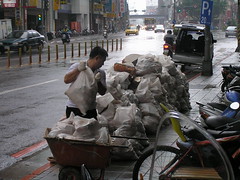 The Taipei Times offered up several views of the upcoming election cycle from local analysts yesterday. First it argued that parties are moving toward the "center".
The Taipei Times offered up several views of the upcoming election cycle from local analysts yesterday. First it argued that parties are moving toward the "center".
